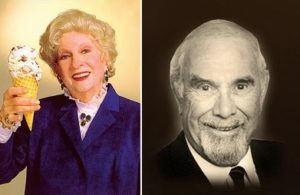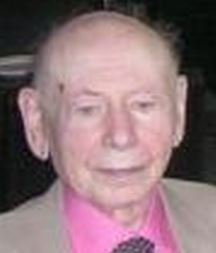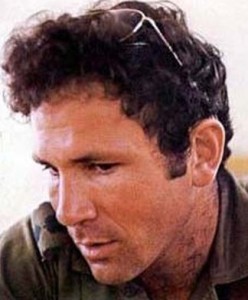
Rose and Reuben Mattus
Reuben Mattus (1912-1994) was born in Poland during World War I, which took his father’s life. He and his mother moved to New York when he was still a child. To make a living, the two worked at an ice cream parlour run by Mattus’ uncle, where ten-year old Reuben would squeeze lemons. By the time he finished high school, the family business was making chocolate ice cream bars and ice cream sandwiches, and sold them from a horse-drawn carriage. They opened up an ice cream factory in Brooklyn, where a young Rose Vesel (1916-2006) was hired to be a bookkeeper. Rose also immigrated with her Polish-Jewish family to New York as a five-year old. She first met Reuben on the streets of Brooklyn, and the two finally married in 1936. Two decades later, the couple decided to open up a new ice cream company. This ice cream would be richer and thicker, made with natural ingredients and butterfat as opposed to the artificial ingredients commonly used by other ice cream makers at the time. Since foreign-sounding names typically market better, Reuben came up with the Danish-sounding “Häagen-Dazs”, and put a map of Denmark on the logo. He did this as a tribute to Denmark, a country which strove to protect its Jews during the Holocaust. (The name “Häagen-Dazs” doesn’t actually mean anything in Danish!) While Reuben developed the recipes, Rose would sell the ice cream – initially by giving out free samples at supermarkets and universities, then catering to upscale restaurants. By 1973, Häagen-Dazs was the only ice cream being sold across the US, and opened its first official store just three years later. The Mattus’ sold the company for $70 million in 1983, but stayed on as consultants. Today, Häagen-Dazs is among the best-known ice cream brands in the world, and continues to operate ice cream shops all over the globe. (It still uses natural flavours and avoids using emulsifiers and artificial stabilizers like guar gum and carrageenan.) Reuben and Rose Mattus have been called the “Emperors of Ice Cream”, much like their fellow Jewish compatriots Baskin & Robbins and Ben & Jerry. Aside from ice cream, the Mattus’ were noted philanthropists, and strong supporters of Israel. They founded a school in Herzliya which still bears their name, and funded the construction of multiple settlements. They also financially supported the controversial Rabbi Meir Kahane, founder of the Jewish Defense League (JDL), as well as the Likud party. Rose Mattus sat on the board of the Zionist Organizations of America, and was reportedly a good friend of both Ariel Sharon and Benjamin Netanyahu. In 2004, she published a book detailing the incredible story of Häagen-Dazs.
Words of the Week
It is better to have an Israel that everyone hates, than an Auschwitz that everyone loves.
– Rabbi Meir Kahane


